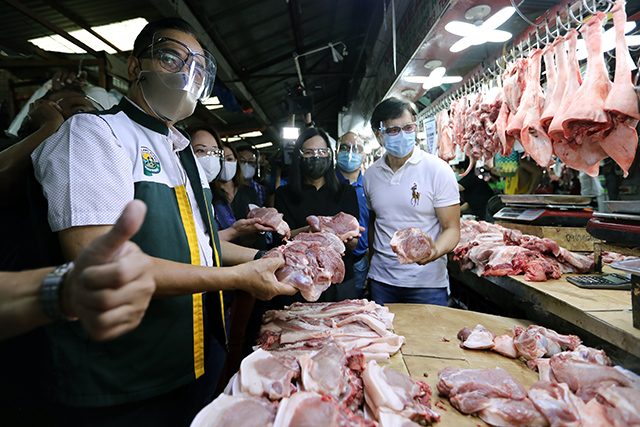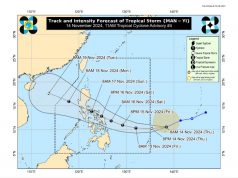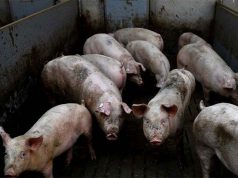
(Updated Feb. 25, 2021; 4:07 p.m.) The plight of meat sellers were brought to light online amid the the implementation of the price ceiling on pork and chicken products in major public markets.
Stalls of pork and chicken in major public markets in Metro Manila were reportedly empty on Monday, the first day the price cap was implemented.
Some meat vendors staged “pork holiday” and refused to sell their pork and chicken products to protest the price ceiling implemented by the government.
On Tuesday, CNN Philippines reported that some pork stalls at the Mega Q Mart in Quezon City have reopened with limited products.
Chicken stalls remained closed, the report added.
Day 2 of price caps on pork, chicken: Pork stalls have reopened in Mega Q Mart, but most only sell innards, batok, pig face/maskara. Chicken stalls remain closed.
DA, DTI, MMDA will inspect this market later this morning | @meltlopez pic.twitter.com/wdGtxd2Ecx
— CNN Philippines (@cnnphilippines) February 8, 2021
The government attributed the low supply of pork to the African swine fever outbreak in the country which consequently led to the spike in the prices of pork products in the market.
Pork and chicken prices under the new EO
The high costs of key food items in public markets prompted some national government agencies and local government units to draft an executive order to approve the price ceiling on agricultural goods.
READ: Gov’t agencies, LGUs bat for price ceiling on veggies, meat
President Rodrigo Duterte signed this as Executive Order 124 on February 1.
Republic Act 7581 or the Price Act defines price ceiling as the “maximum price at which any basic necessity or prime commodity may be sold to the general public.”
It is imposed for 60 days or two months.
Under the new EO, the mandated price ceiling for selected pork and chicken products in the National Capital Region are:
Pork
Kasim/Pigue – P270 per kilo
Liempo – P300 per kilo
Dressed chicken – P160 per kilo
Kristine Evangelista, DA’s assistant secretary for agribusiness, earlier explained that the period or gap between the EO announcement and the implementation date serves as the “grace period” for meat dealers, traders, and other stakeholders.
“Now that the EO is announced, we told them that their concerns are taken into consideration i.e. grace period, some of them requested for that. We wanted to give them the reassurance that they will recover their capital investments,” Evangelista said last week.
Why meat vendors are opposing the price cap
While consumers welcomed the new policy, some Filipinos noted the reasons why market vendors mark up the prices of their meat products.
“Mahal ang bayad sa pwesto, sadyang mahal ang karne mula sa traders, pagod at puyat dahil gigising ng alas 2 ng madaling araw at titigil sa pagtitinda bandang alas 8 ng gabi, sila ang kinontrol ang presyo sa halip na tingnan ang kabuuang problema kung bakit nagmahal ang presyo,” one Facebook user said.
“Instead of price ceiling, dapat subsidized ng government yung price increase. Kawawa naman yung mga nagnenegosyo ano yun pamigay na lang?” another commented.
Other Filipinos schooled those commenting that there are still meat, fish and vegetable items in the supermarket.
“Wala naman talagang paraan kundi saluhin ng consumer yung pasanin ng presyo o mag import ng supply or else tuluyang mamamatay yung market. Nakakatawa yung mga tao na okay lang daw sa kanila na walang baboy at manok sa palengke. Well hintayin ninyo lumobo yung presyo ng mga gulay at isda dahil sa sobrang demand kundi kayo ma high blood at atakehin sa puso,” a Facebook user said.
“One must understand na kapag nagpatuloy itong pork holiday at dumating sa point na kaunti o wala ng magtitinda, maghahanap ang tao ng alternatives which is fish/vegetables. Ang mangyayari tataas ang demand ng Fish and Vegetables na magreresulta sa pagtaas din ng presyo nito,” another wrote.
Palace earlier urged the vendors to reconsider their strike for the general public.
“Well, sinusuportahan po natin iyong advocacy na alternative pork sources pero nakikiusap po kami sa ating mga nagtitinda, sana po ay ipagpatuloy ninyo ang pagtitinda ng baboy,” presidential spokesperson Harry Roque said in a briefing on Tuesday.









